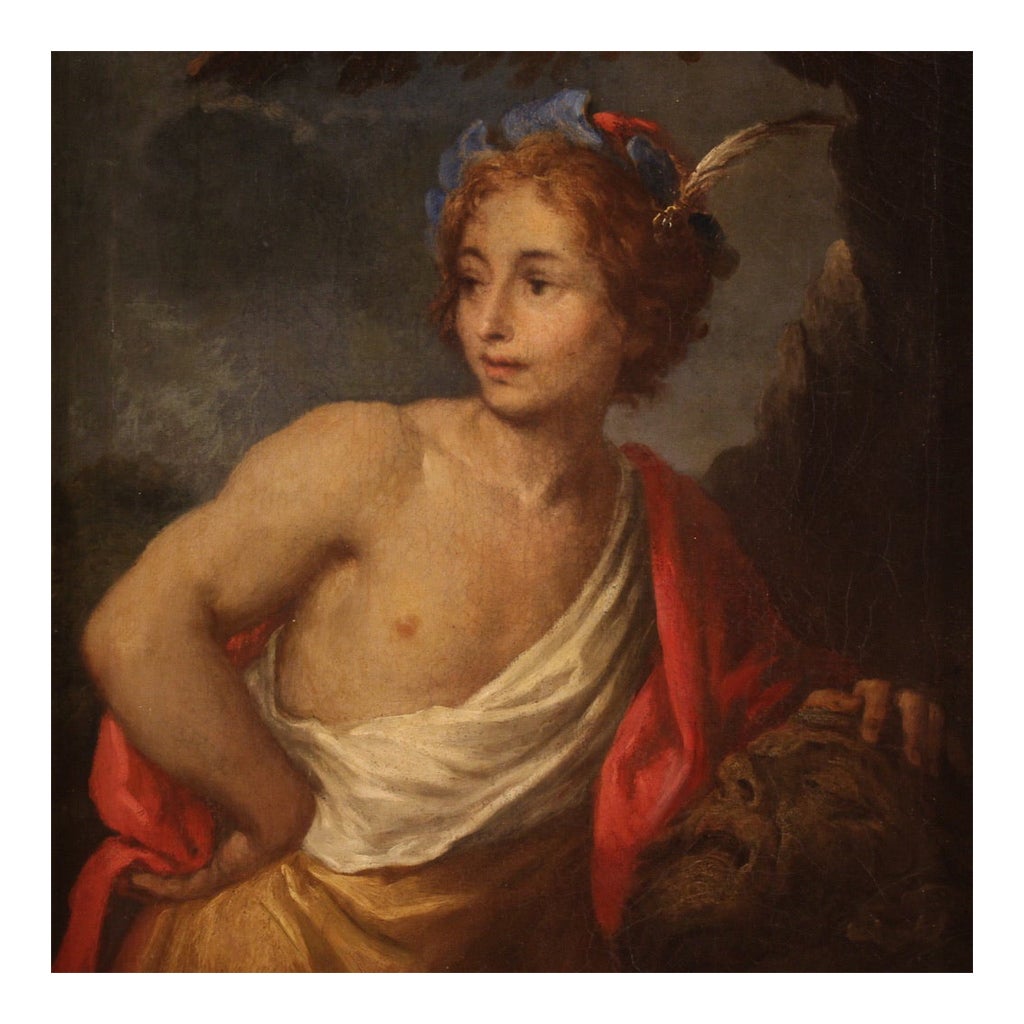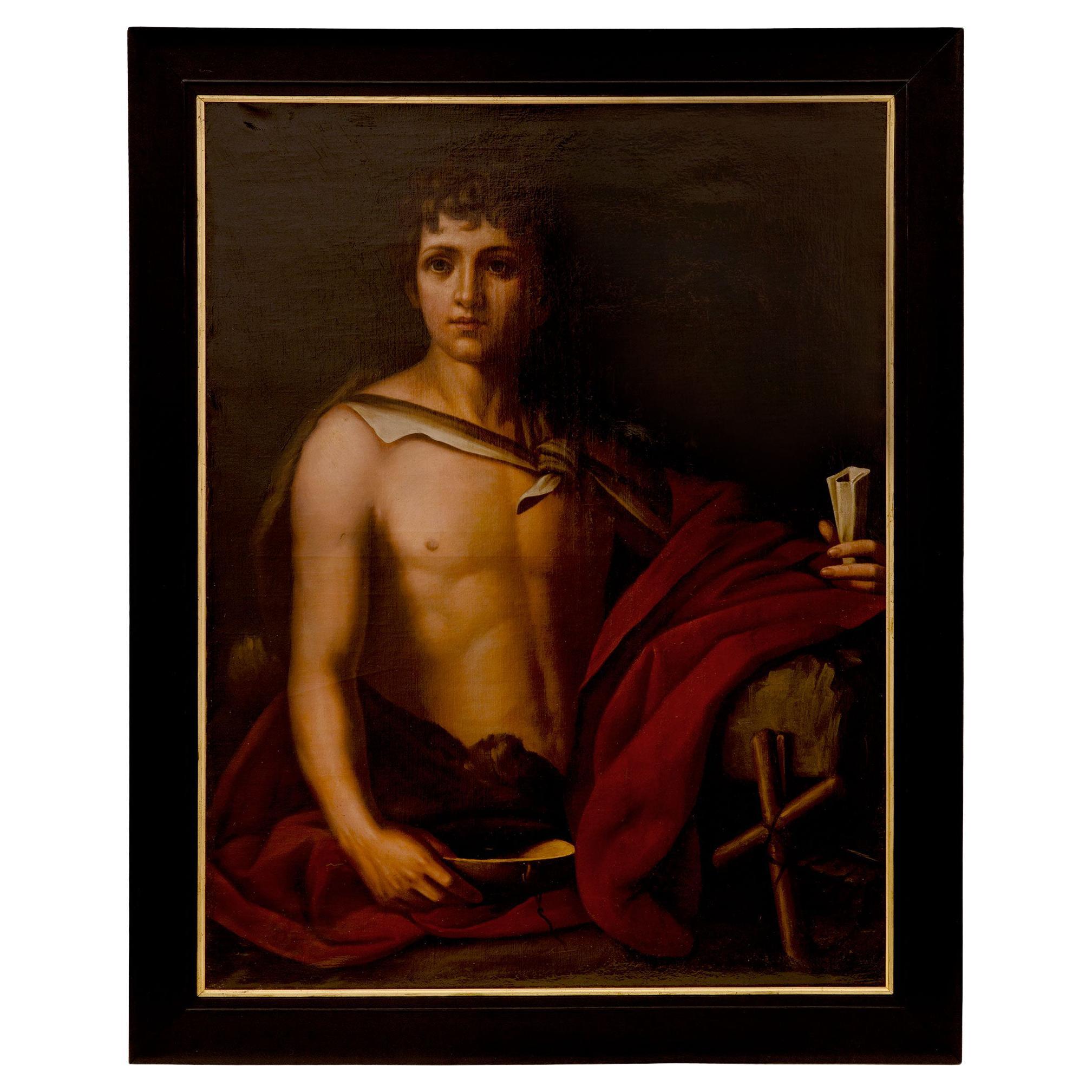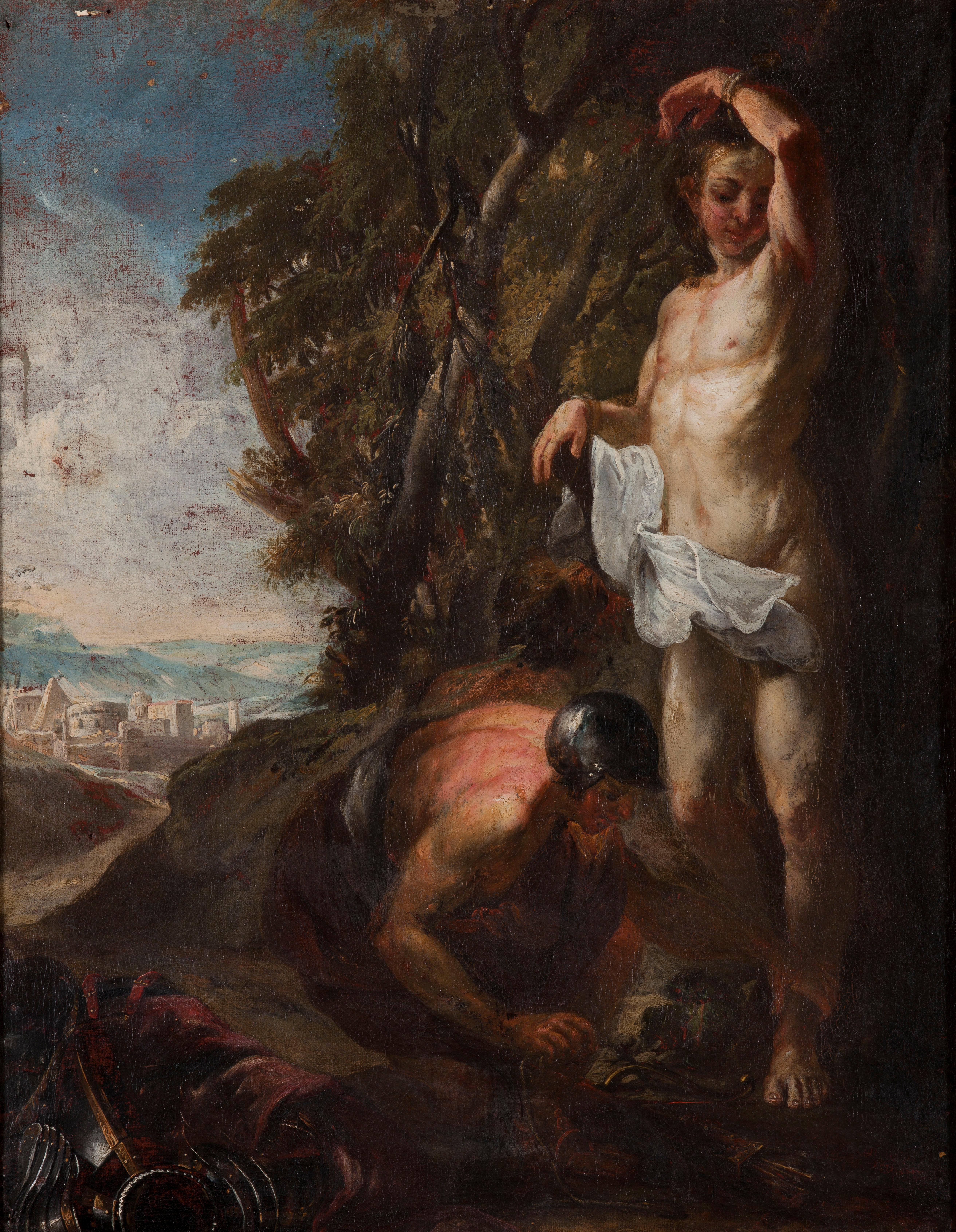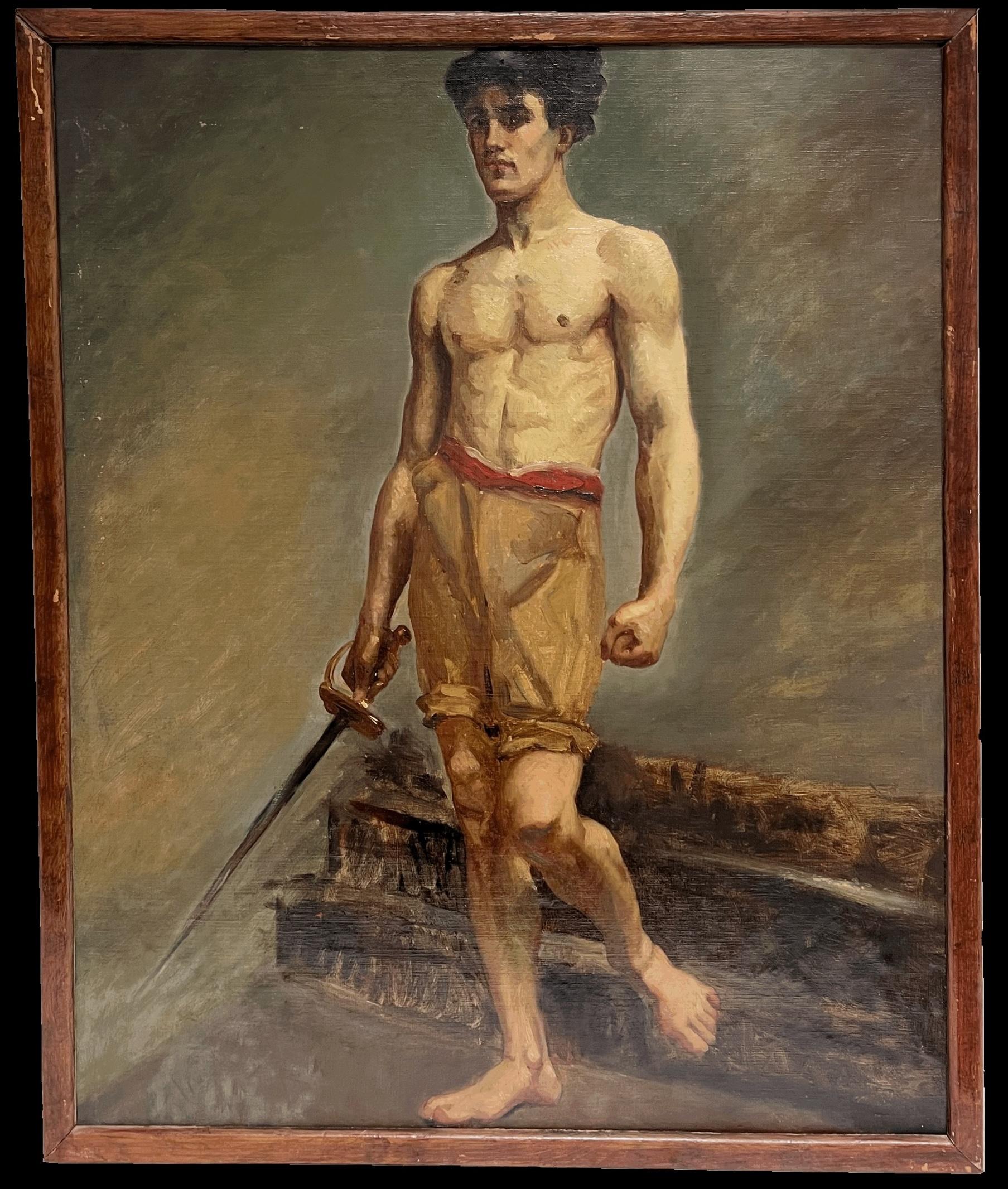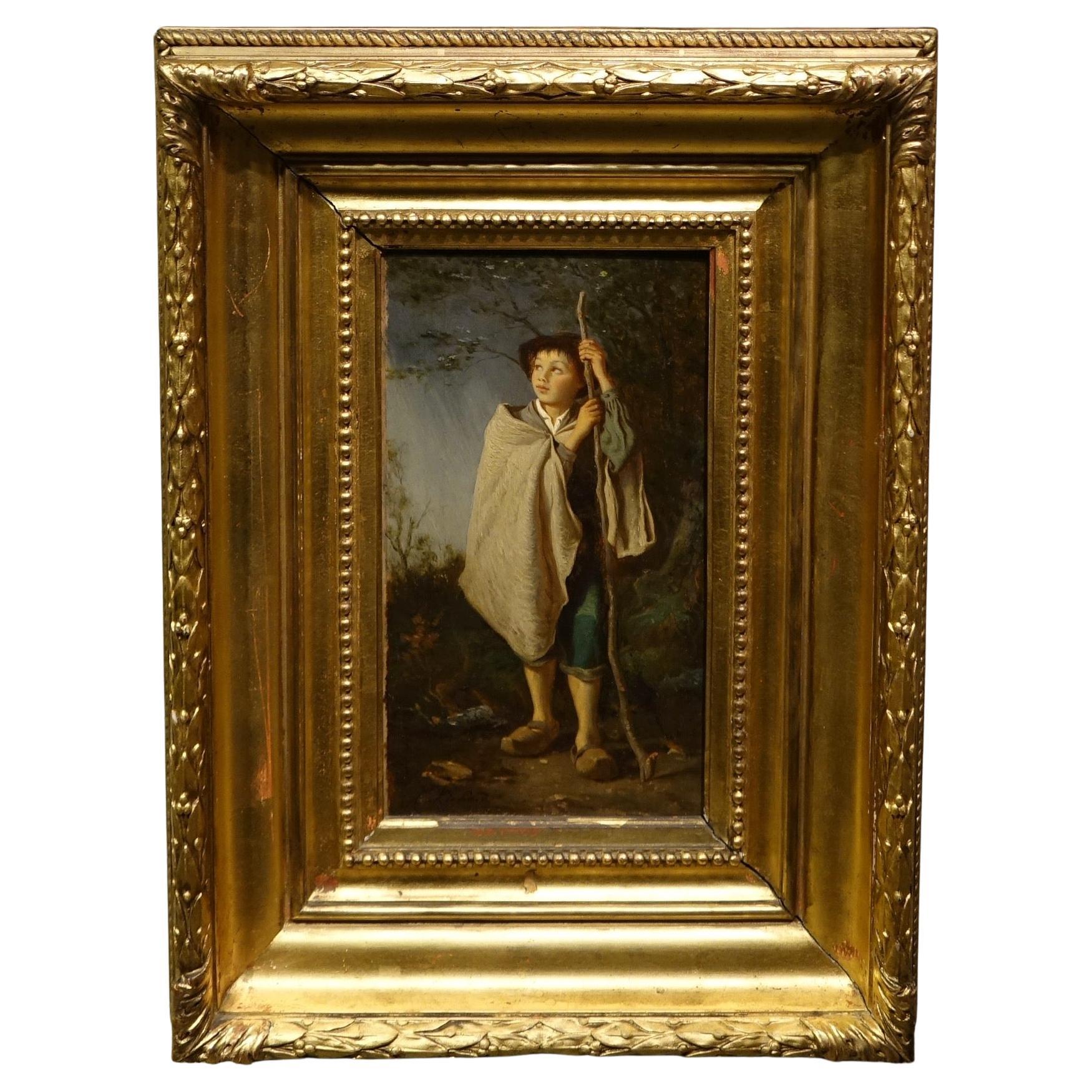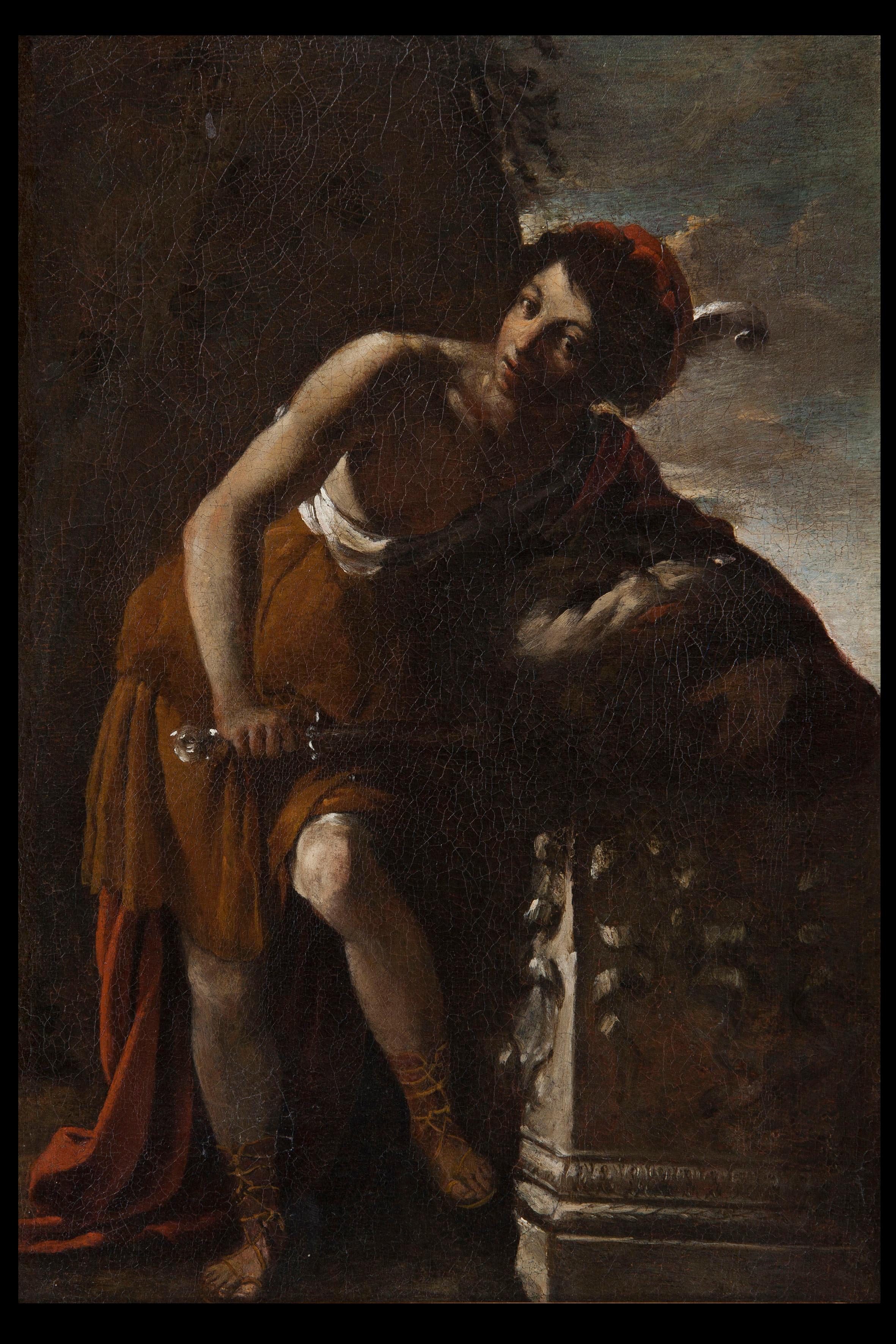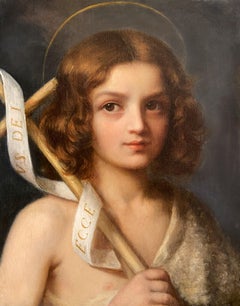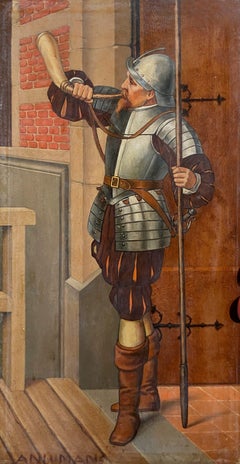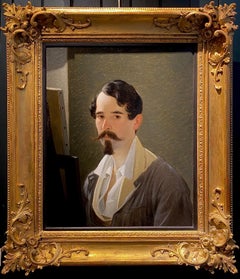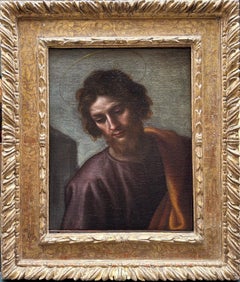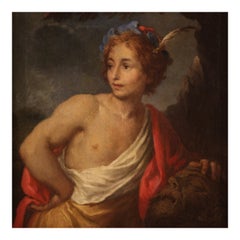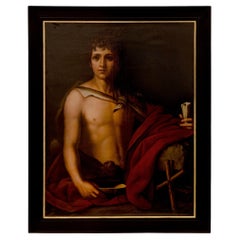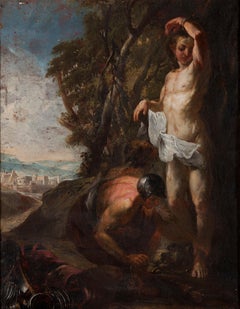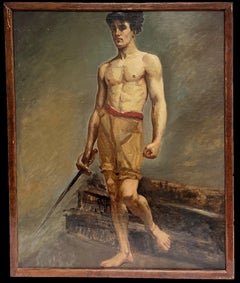Items Similar to David with the Head of Goliath, 19th Century Victorian Oil
Want more images or videos?
Request additional images or videos from the seller
1 of 6
John Rogers HerbertDavid with the Head of Goliath, 19th Century Victorian Oil1850
1850
$33,086.67
£24,000
€28,025.90
CA$45,748.21
A$50,225.83
CHF 26,202.92
MX$607,802.46
NOK 328,412.96
SEK 309,451.35
DKK 209,205.86
About the Item
John Rogers Herbert RA
1810- 1890
Oil on canvas, dated '1850' lower right on sword strap
Image size: 33 ½ x 23 ½ inches
Gilt Watts frame
This striking painting, depicts David as a young boy holding behind his back the head of the champion of the Philistines, the giant Goliath, by the hair. The light catches on David's chest, arm and face, on the massive sword hilt of Goliath and the young tree behind, but everything else is quite dark. The two trees obviously represent David and Goliath, with the old larger tree dead and the green younger tree full of light and vigorous youth.
We see a very young courtier, a flamboyant youth of dazzling beauty and with a touch of arrogant defiance on his face. David is shown with his shepherds bag and stick, but also he holds a magnificently decorated but very heavy sword, given to him by King David. This sword evokes in the viewer the impression that the boy might have a great calling. David would indeed become the great warrior and king, the founder of the royal glory of Israel.
For a work painted in 1850 it has quite a surreal and modern feel to it and with its attention to detail you can see why he influenced the Pre Raphaelites.
The Artist:
John Rogers Herbert was born 23 January 1810 at Maldon in Essex. The family had enough money to send young Herbert to London when he was sixteen years old; and he was enrolled in the Royal Academy schools in December 1826. After the death of his father in 1828, Herbert was forced to give up the Academy school and began painting professionally – mostly book illustrations and portraiture. However, sketches from as early as 1829, such as Captives predict his later interest in larger historical subjects with challenging moral themes and complex compositions.
His first exhibit at the Royal Academy was in 1830, Portrait of a Country Boy.
Later in the decade, Herbert, like many of his contemporaries, displayed a growing interest in medievalism. One reason for this may be his friendship with A.W.N.Pugin who would become the co-architect of the Palace of Westminster and a proponent of medieval revival. Herbert and Pugin had known each other from childhood, and were very close, intimately involved in each other’s affairs.
At the age of 28 Herbert was already a success even painting a portrait of Princess Victoria in 1834. In 1841 Herbert was elected an Associate of the Royal Academy, and became a full member in 1846.
Herbert was a prolific teacher of art. In 1841 he became ‘master of the figure’ in the newly formed Government School of Design, a position probably owed to his artist friend William Dyce who was superintendent there, and with whom he collaborated in the illustration of Nursery Rhymes, Tales and Jingles.
Herbert was earnest and methodical in both his subjects and his technique. Evidence of this earnest practice can be found in the extensive research Herbert undertook for many of his paintings. He travelled to the East many times to paint the landscape, clothing and architecture of the area, in order to add authenticity to his biblical scenes.
Herbert’s innovative techniques, borrowing from mediaeval, German and Nazarene art influenced the young Herbert’s innovative techniques, borrowing from mediaeval, German and Nazarene art influenced the young Pre-Raphaelite Brotherhood. He instructed all the young members of the Brotherhood during their sojourn at the Royal Academy Schools, he gave personal support to James Collinson, and perhaps other members, during the formation of the Brotherhood, and was even a potential proprietor of The Germ. Yet, when W.M. Rossetti declared they wished to ‘out-Herbert Herbert’ he had more aesthetic and theoretical considerations in mind. The Pre-Raphelites drew on Herbert’s historical subjects of the 1840s for inspiration, and his influence can be especially seen in their early pictures.
- Creator:John Rogers Herbert (1810 - 1890, British)
- Creation Year:1850
- Dimensions:Height: 33.5 in (85.09 cm)Width: 23.5 in (59.69 cm)
- More Editions & Sizes:1 of 1Price: $33,087
- Medium:
- Movement & Style:
- Period:
- Condition:
- Gallery Location:London, GB
- Reference Number:1stDibs: LU5247319882
About the Seller
5.0
Vetted Professional Seller
Every seller passes strict standards for authenticity and reliability
Established in 2007
1stDibs seller since 2014
82 sales on 1stDibs
Typical response time: 4 hours
- ShippingRetrieving quote...Shipping from: London, United Kingdom
- Return Policy
Authenticity Guarantee
In the unlikely event there’s an issue with an item’s authenticity, contact us within 1 year for a full refund. DetailsMoney-Back Guarantee
If your item is not as described, is damaged in transit, or does not arrive, contact us within 7 days for a full refund. Details24-Hour Cancellation
You have a 24-hour grace period in which to reconsider your purchase, with no questions asked.Vetted Professional Sellers
Our world-class sellers must adhere to strict standards for service and quality, maintaining the integrity of our listings.Price-Match Guarantee
If you find that a seller listed the same item for a lower price elsewhere, we’ll match it.Trusted Global Delivery
Our best-in-class carrier network provides specialized shipping options worldwide, including custom delivery.More From This Seller
View AllSt John the Baptist as a Child, Early 19th Century Italian School, Oil Painting
Located in London, GB
Oil on canvas
Image size: 15 x 19 inches (38 x 48.25 cm)
Handmade gilt pierced frame
This is a beautiful early 19th Century Italian Old Master oil painting with the subject matter ...
Category
Early 19th Century Italian School Portrait Paintings
Materials
Canvas, Oil
The Palace Guard, Oil on Panel Signed Painting
Located in London, GB
Oil on panel, signed bottom left
Image size: 6 x 11 inches (15.25 x 28 cm)
This painting depicts a 16th century palace guard standing outside of an open door, wearing a set of armou...
Category
19th Century Figurative Paintings
Materials
Oil, Panel
Self Portrait. Original Oil Painting Austrian 19th Century
Located in London, GB
Joseph Weidner
Austrian 1801 - 1870
Self Portrait
Oil on canvas, signed lower left
Image size: 23 x 19 inches (58.5 x 48.5 cm)
Original gilt swept fra...
Category
1860s Vienna Secession Portrait Paintings
Materials
Oil
John the Baptist
By Francesco Curradi
Located in London, GB
Oil on canvas
Image size: 17 x 21 inches (43 x 53 cm)
18th Century Carlotta frame
Provenance
Private Country Estate
When depicting John the Baptist artists often added an outer ga...
Category
17th Century Portrait Paintings
Materials
Canvas, Oil
Touchstone and Corin, British Pre-Raphaelite 19th Century Oil on Canvas
Located in London, GB
Adolphus M. Madot
Circa 1833 - 1861
Oil on canvas
Image size: 36 x 24 inches (91.4 x 61 cm)
Arched Pre-Raphaelite style frame
The subject of the present picture is the dialogue between the court jester Touchstone and the shepherd Corin in the Forest of Arden ( As You Like It, Act III, scene 2). The work of William Shakespeare 'As You Like It' was a popular literary source in Pre-Raphaelite circles, inspiring such artists as John Everett Millais, Walter Howell Deverell and Arthur Hughes. The present picture is comparable in style to the work of Edward W. Rainford and Henry Stacy Marks...
Category
1850s Pre-Raphaelite Figurative Paintings
Materials
Oil
Soldier in an Interior, Early 17th Century Dutch Oil
Located in London, GB
Pieter Symonsz Potter
Dutch 1600 - 1652
Soldier in an Interior
Oil on oak panel, red seal to reverse
Image size: 15 x 10 3/4 inches
Dutch Ebonised frame
Bathed in a well lit roo...
Category
Early 17th Century Old Masters Portrait Paintings
Materials
Oil, Board
You May Also Like
17th Century Oil on Canvas Italian Painting David with the Head of Goliath
Located in Vicoforte, Piedmont
Italian school painting from the second half of the 17th century. Oil on canvas artwork depicting David, the biblical hero, captured in the moment of triumph with the head of Goliath...
Category
Antique 1670s Italian Paintings
Materials
Canvas
Italian 19th Century Neo-Classical St. Oil on Canvas Painting of a Young Man
Located in West Palm Beach, FL
A fine Italian 19th century neo-classical st. oil on canvas painting of a young man. The young man has his red cloak draped over his left arm while holding a scroll in his left hand....
Category
Antique 19th Century Italian Neoclassical Paintings
Materials
Canvas, Giltwood
17th-18th Century By Louis Cretey Saint Sebastian Oil on Canvas
By Louis Cretey
Located in Milano, Lombardia
Louis Cretey (Lyon, France, 1635 - 1702)
Title: Saint Sebastian
Medium: Oil on canvas
Dimensions: with frame 91 x 75 x 5 cm - without frame 77 x 60.5 cm
With a "cassetta" frame in ...
Category
17th Century Old Masters Figurative Paintings
Materials
Oil, Canvas
$15,991 Sale Price
20% Off
Fine 19th C. French Academic Oil Painting Portrait Semi Nude Male with Sword
Located in Cirencester, Gloucestershire
Study of a Semi Nude Man holding Sword
French School, late 19th century, unsigned
oil painting on canvas, framed
framed: 30 x 24 inches
canvas: 29 x 23 inches
condition: very good
pr...
Category
Late 19th Century French School Figurative Paintings
Materials
Oil, Canvas
The Young Shepherd , oil on panel signed Antoine Richard, 1822-1891
Located in PARIS, FR
The young shepherd oil on wood panel signed Antoine Richard, 1822-1891.
A painting representing a young shepherd daydreaming, leaning on his stick. ...
Category
Antique Late 19th Century French Napoleon III Paintings
Materials
Wood
Early 17th Century by Carlo Bononi The triumph of David Oil on canvas
Located in Milano, Lombardia
Carlo Bononi (Ferrara, Italy, 1569 – 1632)
Title: The triumph of David
Medium: Oil on canvas
Dimensions: without frame 41 x 28.5 cm – with frame 57 x 46 x 6 cm
Not signed
Provenance...
Category
Early 17th Century Old Masters Figurative Paintings
Materials
Canvas, Oil
More Ways To Browse
19th Century Oil Painting Boy
19th Century Portrait Of Young Boy
Antique Rogers
Palace Of Westminster
Sword Hilt
Antique Nursery Rhyme
John Herbert
A W N Pugin
David Goliath
David And Goliath
Portrait Painting Of Princess
Herbert Young
Marten Huitsing
Maya Green
Mervyn Peake
Moustapha Baidi Oumarou
Naive Art Haiti
Native American Girl Painting
